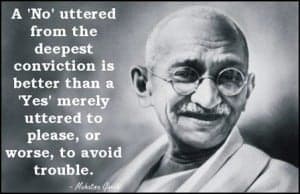Most people have a secret buried so deep that they forget all about it, but that doesn’t make it less real.
So many of us lock this difficult truth away, often taking it to the grave without ever recognizing it, much less acknowledging it.
My goal is to do more than just tell you this common subconscious secret. I’m going to help you see it in action all around you.
Once you see it in others, you may come to understand your own version of it, if you dare. To get started, we will need the help of an imaginary device.
Do the following experiment:
1. Imagine a pair of eyeglasses with special lenses
The lenses install certain beliefs into your perception.
If you insert lenses that say, “Life is beautiful,” then the beautiful aspects of life will be revealed, as the cliché “rose-colored glasses.”
If you insert “The world is dangerous,” into the glasses, suddenly you will begin to perceive all the ways you might be harmed.
The imaginary glasses create a perceptual filter for interpreting your experience. If you look at the world through a consciously chosen filter or belief, then you can evaluate whether or not the belief seems accurate or serves you in some way. Keep it handy if you like the new belief. Discard it otherwise.
2. Install the average person’s secret
Once you are comfortable with the imaginary glasses concept, install the following lens, and go about your business.
The lens to install is this: People are addicted to misery.
You can substitute any synonym you want for misery: unhappiness, rejection, shame, negativity, failure, etc…
What I mean is, people consistently do things that make them unhappy. Most of us are experts in the art of self-sabotage. We routinely mess up our diets, business plans, relationships, and all kinds of goals by doing the very things that make us feel like failures. Then, we give ourselves a thorough thrashing for doing it!
I have rarely met anyone, myself included, who does not have at least one area of chronic dissatisfaction. In the vast majority of cases, the individual is doing things that directly create dissatisfaction, then complaining about it, magnifying the dissatisfaction many times over. Then, they do it all over again.
Here’s the kicker. When you suggest obvious and available choices they might make to stop creating the misery, they resist or become defensive. It’s an addiction we are dealing with here.
3. Don’t analyze or make excuses for anyone – just observe, take notes, see what fits
With your glasses on, simply observe how much reality might fit logically within your temporary belief. Does your new filter explain much of what you see going on around you? You might observe the following:
A person who wants to lose weight munching potato chips.
A man deliberately doing childish things, inviting exasperation, and correction from his wife.
A woman goading her husband into a fight.
A dad disrespecting his children, inviting rebellion.
A mom yelling about how much she hates it when people yell.
Someone who hates feeling pressure procrastinating doing a project until the last minute.
A coworker who thinks his supervisor is overbearing while dodging every opportunity to do his part at work, inviting closer supervision.
And so on…
As you observe people engaging in these kinds of behaviors, does it support your temporary belief that people are addicted to misery? Does it appear they consistently do things that invite misery, pain, and failure into their lives?
I submit that people can be addicted to negative feelings – at least in some areas of life. If this weren’t the case, we’d have to say people are simply stupid, which is probably not the case.
 Achieving Inner Congruence
Achieving Inner Congruence
The field of NLP has long been an advocate of congruence or personal alignment. Congruence means that your actions match your words.
Here are some examples:
Incongruent: You say you want to lose weight, then eat pizza and ice cream.
Congruent: You say you want to lose weight and follow a plan.
Incongruent: You say you want to save for retirement, but buy a new car instead.
Congruent: You say you want to save for retirement and do so.
Achieving congruence between your words and actions requires honesty and awareness. The deeper your honesty and insight, the deeper your congruence.
If you sabotage your diet on a regular basis, inviting feelings of frustration, shame, failure, and general misery, then you can learn to be honest about it. You might say to yourself:
I have sabotaged my diet. Honestly, I have come to expect and even find a strange satisfaction in the feelings of shame and frustration that come when I blow a diet. I am willing to recycle those feelings again and again and am even addicted to them. I don’t know what life would be like without feeling bad about myself, and I am afraid to know.
Is this some kind of twisted affirmation? No. It is simply the truth in many cases. It is not what we desire to be true. It is what is actually true. This is deep honesty, deep congruence. Living in this kind of honesty leads to deep change. Try it. The truth will indeed set you free.
If you liked this article, you will love our 30-minute free webinar, Ending Self-Sabotage.




